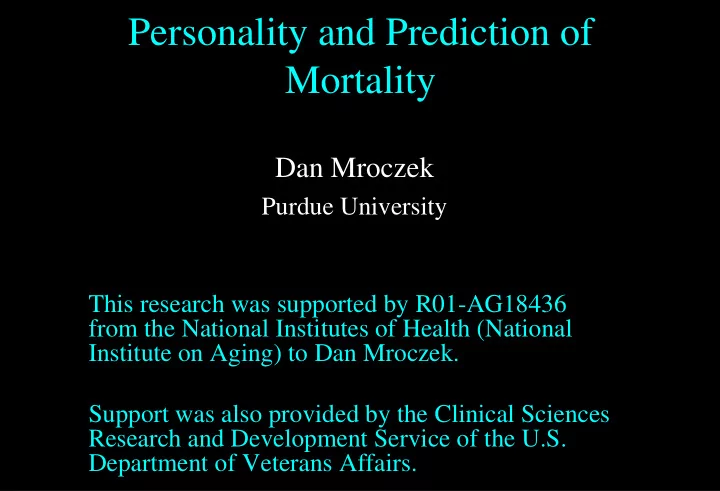

Personality and Prediction of Mortality Dan Mroczek Purdue University This research was supported by R01-AG18436 from the National Institutes of Health (National Institute on Aging) to Dan Mroczek. Support was also provided by the Clinical Sciences Research and Development Service of the U.S. Department of Veterans Affairs.
Personality & Mortality • Personality traits have emerged as important predictors of mortality, starting with Friedman et al.’s (1993) study. • Since then, each of the Big 5, with the exception of extraversion-introversion, have been linked with mortality risk. • Conscientiousness enjoys the greatest number of replications, closely followed by neuroticism.
Causality Issue: Mortality is a Clear Endpoint • In almost all studies, mortality is conceptualized as the endpoint of an explanatory or causal chain. • Mortality is a nicely unambiguous outcome (Friedman & Hampson, 2008).
Personality and Mortality • The fact that mortality is the clear endpoint of any explanatory pathway is one reason for it’s recent popularity as an outcome among personality scientists (e.g., Chapman et al., 2010; Hill, Turiano, Hurd, Mroczek & Roberts, under review). • Yet a bigger reason is that personality variables have turned out to be pretty good predictors of mortality.
The Question of Mechanism • With so many replications of the personality-mortality association (esp. conscientiousness and neuroticism), the questions have now turned toward why personality predicts mortality. • One of the most prominent hypothesized mechanisms are health behaviors. • Certain personality traits, such as (high) neuroticism and (low) conscientiousness, are predictive of important health behaviors such as smoking and excessive drinking.
Smoking & Drinking • Persons high in neuroticism are more likely to smoke, tend to smoke more, and have greater difficulty quitting smoking (Almada et al., 1991 Gilbert, 1995; Kirk et al., 2001; Lerman et al., 2000; Raush et al., 1990). • Higher neuroticism is also related to alcohol abuse and dependence (Almada et al., 1991; Grekin et al., 2006; Larkins & Sher, 2006; Read & O’Connor, 2006)
Testing the Health Behavior Hypothesis • Hypothesis: Higher neuroticism will be associated with higher mortality risk, but health behaviors will attenuate the relationship. • We used neuroticism and health behaviors assessed in the mid-1970s, so we had a 30+ year mortality follow-up. • We tested this hypothesis using survival analysis (Cox models).
Decedent Data • Of the 1,788 participants with data from 1975 on both personality and health behaviors, 665 died during follow-up (1975-2008) • Decedent survival time ranged from 1 to 29 years, with a mean of 17.4 (SD=7.9). • The vast majority of deaths were due to heart disease or cancer. Very few were due to accidents and only one to suicide.
Neuroticism (1975) Predicts 30 Year Mortality Risk (from Mroczek, Spiro & Turiano, 2009; JRP) Risk Factor Model 1 Model 2 Model 3 Age 1.10*** 1.11*** 1.11*** Neurot. 1.11*** 1.09** 1.08** (SD units) Smoking 2.13*** 2.11*** Drinking 1.00
Neuroticism & Mortality • Neuroticism predicts mortality over 30 years. • Smoking explains a portion of the Neuroticism- Mortality association. • What explains the rest? Physiological factors (overactive autonomic nervous system, excess cortisol)?
Trait Change and Mortality • What is the relationship between trait change and mortality risk? • Do personality traits change? • One answer to this question is for whom does personality change.
Individual Differences in Trait Change • When personality trait trajectories are estimated (and there is a high bar for such analyses: multiple measurement occasions over many years) it becomes clear that personality change itself is an individual differences variable. • Every study that has modeled trajectories has found this (the first was Jones & Meredith, 1996).
Change Itself is an Individual Differences Characteristic • Rate of change – typically estimated with MLM or SEM – significantly varies across people (Mroczek & Spiro 2003; Small, Hertzog, Dixon & Hultsch, 2003). • Some people change more than others – and some do not change at all (a slope of zero). • This is the principle of individual differences in change (Baltes & Nesselroade, 1978).
Change in Personality is Similar to Change in Cognitive Functioning • Yet, for most, the change is not dramatic (less than an SD). • Analogous to cognitive change. Important cognitive variables like memory, speed of processing, or executive function, change only gradually over as we age. Memory decline takes years to notice. • Personality change operates similarly.
Testing if Decline in Neuroticism is Associated with Lower Mortality Risk • If one’s trait level changes, even only a small amount, then the mortality risk should change as well. • Analogous to change in BP or cholesterol. • We tested whether the individual variability in Neuroticism change was associated with mortality risk – Used survival analysis (Cox models) – Adjusting for age & health (subjective and objective)
Decedent Data • Of the 1,663 NAS participants with personality change estimates, 469 died in the following years (1988-2003) • The 469 decedents lived an average of 8.55 years (SD=4.12) during the mortality follow-up period starting in 1988.
Personality Change and Longevity Q 4 Q 1-3
Implications • Those who showed greater decline in neuroticism survived longer. • If interventions can raise conscientiousness or lower neuroticism, it could potentially improve people’s health and even allow them to live longer. • This is largely unknown territory.
Thank you for your attention! Don’t worry; live longer!
Recommend
More recommend